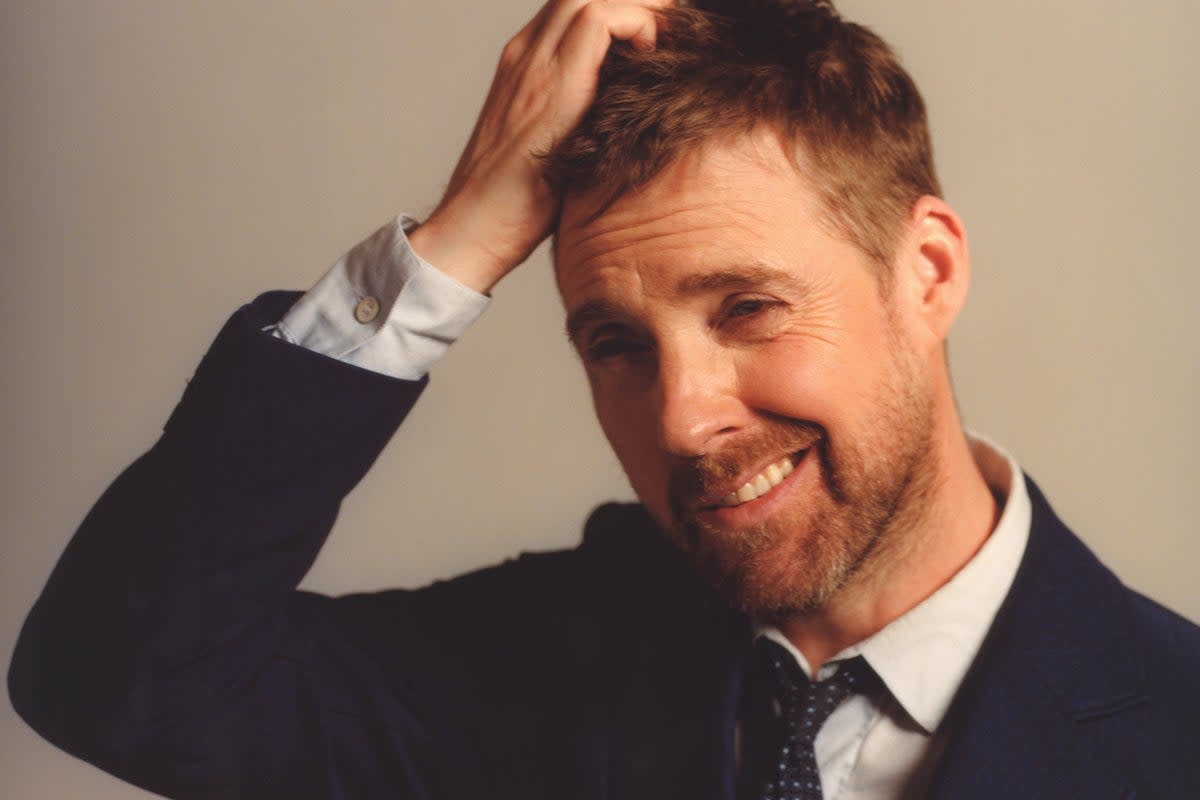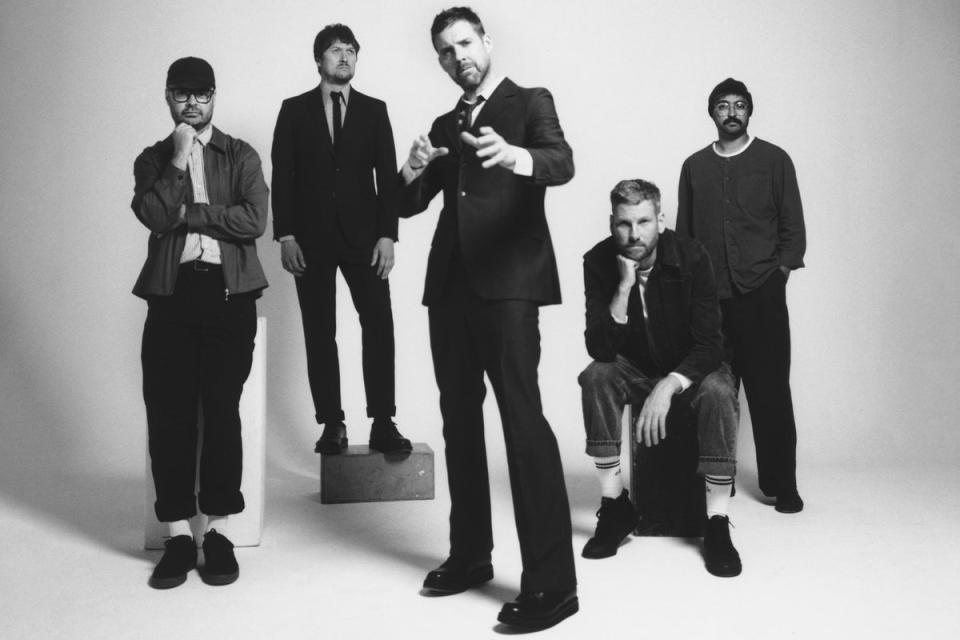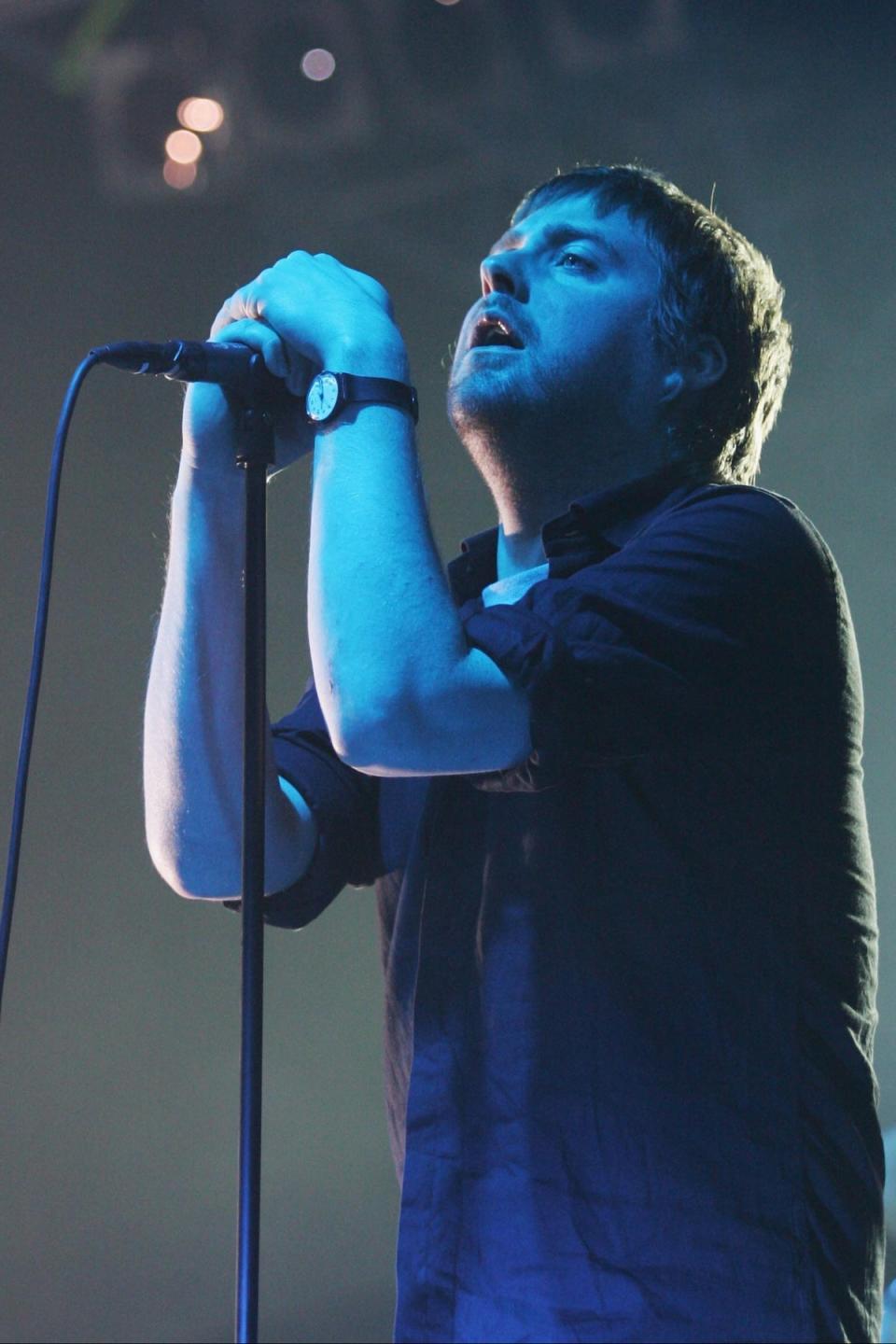Kaiser Chiefs’ Ricky Wilson: ‘We were an acceptable punching bag’

In a café in north London, silent but for the whirr of coffee makers and steam, the frontman of the Kaiser Chiefs is wondering why people used to make fun of the Kaiser Chiefs. “I think we were an acceptable punching bag,” Ricky Wilson says, still a little bruised. He remembers an NME Awards in the late Noughties, when a comedian introduced the Best Album category and joked that the award was meaningless as Kaiser Chiefs had won it a few years earlier. “And he said it because he knew it was an acceptable joke, and that no one was going to complain about it.” Wilson shakes his head. “It annoyed me because even if you think our band’s s***, it’s still an easy joke. We were an easy punch for a lot of people.”
The band arrived in 2004, pre-poptimism. Pitchfork was still mean. Nothing was more objectionable than a band actively wanting a hit record, which the Kaiser Chiefs did. Wilson didn’t particularly help in that department, infamously joking in 2005 that he’d “w*** off a tramp for success”, but I digress. Boris Johnson dubbed them “weeds from Leeds” in a newspaper column. Noel Gallagher despised them, somewhat inevitably, claiming they sat “on top of an apex of meaninglessness”, among far more cruel jibes. A book called Is It Just Me or Is Everything S***? devoted substantial page space to their output.
“We became quite big quite quickly, and we were having fun, and we wouldn’t bite back because we didn’t care,” Wilson remembers. But among the winklepickers and gurning, the bouncy protest anthem “I Predict a Riot” and the cocky, middle-fingers-to-the-world of “Everyday I Love You Less and Less”, though, was a problem: Wilson did actually care. Perhaps too much.
“I wasn’t ready for a lot of it,” he says. “Some stuff was quite hurtful.” He stirs his coffee with one hand, and clutches his chin with the other. “I think to be the biggest band in the world, you have to really not care about people not liking you. And that’s why we never really broke into that stadium territory because I cared too much about people not liking me. If you’ve got balls of steel, you just push on through.”
Kaiser Chiefs remain one of Britain’s greatest indie rock oddities, but not really for their music. That’s always been quite conventional: bombastic crowd-pleasers that everyone recognises. Calling their songs by their actual titles seems to diminish the vastness of their reach. “Ruby”? It’s “Ruby-Ruby-Ruby-Ruby / ahh-ahh-ahh-ahh-ahh-ahh,” surely? But they were odd in that their popularity – more than eight million albums sold, three Brits, an Ivor Novello, a Mercury Prize nod – often clashed with the idea people had of them.
“We were very cool for a short period of time,” Wilson says. “And if you’re cool for a short time, then you’re very uncool after that. People will turn against you.”
The new album doesn’t have to go to number one – it’d be nice if it did, but it’s not going to be the end of the world if it doesn’t. It doesn’t bother me. It used to bother me, but that’s just ego
But during those disorientating years of mainstream popularity mixed with endless p***-taking, something strange happened. Landfill indie’s pantomime villains, your Johnny Borrells and your Prestons, were cast adrift, lost in a sludge of forced miserabilism and interview walk-outs. The mood around Pete Doherty got really dark. Sometimes I wonder what ever happened to The Paddingtons. Wilson and his band, though, managed to grab hold of a buoy. It may have been The Voice, the BBC’s ramshackle X Factor clone, which Wilson judged for three years between 2013 and 2015, and helped send his group back up the charts. Or it may have been Wilson’s natural showmanship, the lairy, pleasing blokey-ness of his singing voice, the undeniable catchiness of his band’s choruses. Whatever it was, we’re now here to chat about their eighth album. Yes, that’s correct – eighth album. He doesn’t quite get it either.
“I was really concerned a couple of years ago that we’d be remembered as mid-Noughties also-rans,” he laughs. “Like one of those Britpop bands that you don’t really hear about, that don’t have a legacy.” But then he started noticing things. “Time goes by, and I think if you asked loads of people to name three Kaiser Chiefs songs, they could do it. And you hear Leeds United supporters singing our songs up at Elland Road and you go… we’re actually cooler than we thought we were. I think of myself as being deeply uncool. But that’s probably why we’ve survived.”

Wilson is 46 now, dry-humoured and soft-voiced. If there’s something slightly solemn about him, it’s probably just tiredness – he’s a father to two-year-old twins, a man who has traded any hint of rock-star chaos for being in bed by nine and watching Midsomer Murders on his tour bus. But he was relatively clean-living even at his band’s commercial zenith. “I tried my hardest to f*** everything up,” he says. “I just wasn’t that good at it. I didn’t have that kind of commitment.” He concedes he’s “messed up” along the way, over-eating and over-drinking here and there. (Last March, he said he had stopped drinking ahead of shows, admitting that he had begun “relying on old drinking habits” in the months before.) “But I’ve never liked anything that’s illegal. It’s always a lot of hassle. I couldn’t be bothered. And I was having a lot of fun anyway, so I didn’t feel the need to push myself to the outer limits of what everyone else was doing.”
Ambition probably helped, too. He remembers the band having specific goals back then – playing at certain venues, selling a certain amount of records, getting onto Top of the Pops. He had a drive that he thinks has slackened since. “But maybe I haven’t got it anymore because I’ve actually achieved what I wanted?” he asks. Money, he admits, is more of a factor now in his band’s decisions than it used to be. “In the early days, if a festival wanted to book us, we’d say – whatever it was – great, let’s do it! Now it’s more… OK, how much?”
He’s asked himself a lot lately whether this is a good thing. “We’ve done all right financially,” he says. “If we’d have sold the same amount of records we sold in the mid-Noughties 10 years earlier, we’d be a lot richer. And if we sold those same records 10 years later, we wouldn’t have any money. But the beauty of that is I think we’ve hit a sweet spot where if we were richer, we probably would have given up.” How come? “Well, imagine if you made enough money doing a job you really loved that you didn’t have to do it anymore. That’d be awful, wouldn’t it? But if I won the Euromillions tomorrow, I don’t know what I’d do. I probably wouldn’t want to go on tour.”
Kaiser Chiefs’ new record is called Kaiser Chiefs’ Easy Eighth Album, an ironic nod to the fact that Wilson assumed it’d be a breeze to put together. “I still love the pub chats, where you’re writing on napkins and getting excited about something,” he says. “It’s doing it that’s become harder.” You can sense a bit of that behind-the-scenes uncertainty as a listener – it’s more jukebox-y than normal for the band, hopping between Northern Soul, fizzy electropop and Nile Rodgers-produced funk. Those hooks are still there, though, that shimmying, dextrous energy of Wilson’s vocals.
He seems to have a healthy relationship with the band’s new material – accepting that it probably will never eclipse the ubiquity of Kaiser Chiefs’ earlier work, in the charts or in the hearts and minds of their fans. “If you choose to get worried about things, you will get worried about them. It doesn’t have to go to number one – it’d be nice if it did, but it’s not going to be the end of the world if it doesn’t. It doesn’t bother me. It used to bother me, but that’s just ego.”

That said, he finds it funny to be held hostage, in a sense, to his past work. “It’s weird that in the music industry you have to keep making better and better albums. If you’re a painter who’s sold a painting for £2m, your next one is gonna be worth more. Because your value as an artist just keeps growing. But when you make records, you’re expected to constantly be bettering what came before it, or it’s just diminishing results. You get people saying, ‘hmm… we kind of like it, but we like the earlier stuff more – this one gets three stars out of five!’. No one’s saying that to Hockney!”
I suggest to Wilson that, fundamentally, his band’s survival is proof that they must have been doing something right. “I mean, we’ve definitely had unsuccessful albums. But it’s great, ain’t it? To have the opportunity to have an unsuccessful record and then make another one after that… All the people who get remembered have massive ups and downs. The people you don’t remember just have these fast inclines and then quick drop-offs.”
I’m curious if he still wants a bit of the respect that typically eluded the band – for someone to properly recognise that Kaiser Chiefs are still around after more than two decades, selling out venues and producing new music. He wavers a little. Hums and haws.
“It’d be really nice if, by the time my two-year-olds are 18, they’re not embarrassed by me,” he says, finally. “I’d really like them to be quite proud of my band. Because my band’s good! I think we achieved quite a lot for some underachievers.”
‘Kaiser Chiefs’ Easy Eighth Album’ is out now, and the band is touring the UK


